英语随堂笔记
7.19英语(会话)随堂笔记解析
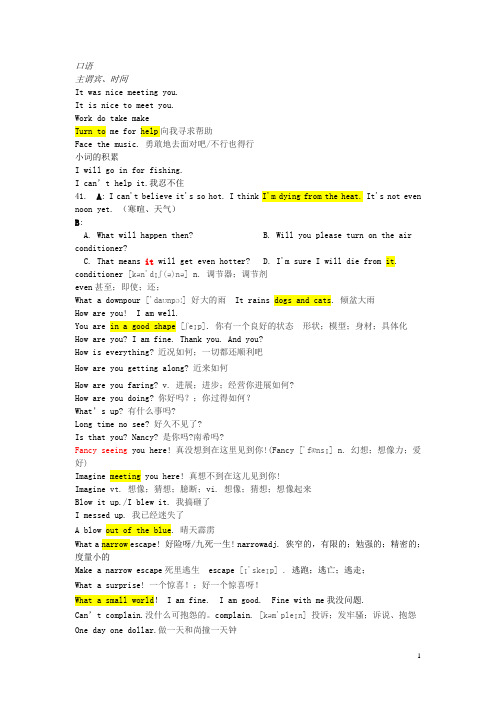
口语主谓宾、时间It was nice meeting you.It is nice to meet you.Work do take makeTurn to me for help向我寻求帮助Face the music.勇敢地去面对吧/不行也得行小词的积累I will go in for fishing.I can’t help it.我忍不住41. A: I can't believe it's so hot. I think I'm dying from the heat. It's not even noon yet. (寒暄、天气)B:A. What will happen then?B. Will you please turn on the air conditioner?C. That means it will get even hotter?D. I'm sure I will die from it. conditioner[kən'dɪʃ(ə)nə] n. 调节器;调节剂even甚至;即使;还;What a downpour ['daʊnpɔː]好大的雨It rains dogs and cats.倾盆大雨How are you! I am well.You are in a good shape [ʃeɪp].你有一个良好的状态形状;模型;身材;具体化How are you? I am fine. Thank you. And you?How is everything?近况如何;一切都还顺利吧How are you getting along?近来如何How are you faring? v. 进展;进步;经营你进展如何?How are you doing?你好吗?;你过得如何?What’s up?有什么事吗?Long time no see?好久不见了?Is that you? Nancy?是你吗?南希吗?Fancy seeing you here!真没想到在这里见到你!(Fancy['fænsɪ] n. 幻想;想像力;爱好)Imagine meeting you here!真想不到在这儿见到你!Imagine vt. 想像;猜想;臆断;vi. 想像;猜想;想像起来Blow it up./I blew it. 我搞砸了I messed up.我已经迷失了A blow out of the blue.晴天霹雳What a narrow escape! 好险呀/九死一生! narrowadj. 狭窄的,有限的;勉强的;精密的;度量小的Make a narrow escape死里逃生escape [ɪ'skeɪp] . 逃跑;逃亡;逃走;What a surprise!一个惊喜!;好一个惊喜呀!What a small world! I am fine. I am good. Fine with me我没问题.Can’t complain.没什么可抱怨的。
四年级下册英语三起点 Module 4随堂笔记A4打印版 共3页
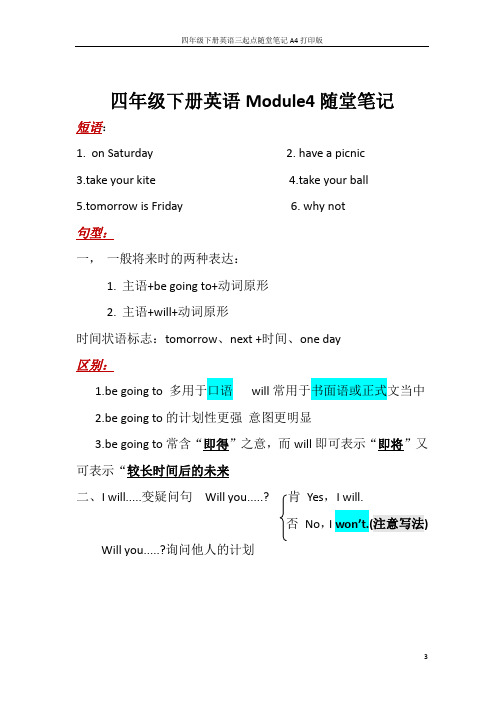
四年级下册英语Module4随堂笔记短语:1.on Saturday2. have a picnic3.take your kite4.take your ball5.tomorrow is Friday6. why not句型:一, 一般将来时的两种表达:1.主语+be going to+动词原形2.主语+will+动词原形时间状语标志:tomorrow、next +时间、one day区别:1.be going to 多用于口语will常用于书面语或正式文当中2.be going to的计划性更强意图更明显3.be going to常含“即得”之意,而will即可表示“即将”又可表示“较长时间后的未来二、I will.....变疑问句Will you.....? 肯Yes,I will.否No,I won’t.(注意写法) Will you.....?询问他人的计划34M4-Unit21. 表示天气的形容词2. 表示天气的动词sunny snowwindy raincoldhot3.描述某地未来的天气状况:1) It will be +表示天气的形容词+in+地点2) It will +表示天气的动词+in+地点(注意:it 在这里支代“天气”)4.询问未来天气状况:1)--Will it be +表示天气状况的形容词+in+地点?---Yes ,it will./No,it won’t.2) ---Will it +表示天气状况的动词+in+地点?---- Yes ,it will./No ,it won’t.5.注意:cl ou dy 的ou 发音与h ou se 相同Module 4笔记1.Ifly too.也用于句末(+动词原形)2.On Saturday,we’re going to have a picnice. 举行一次野餐be going to+动词原形(计划性更强)3.Will you take your ball tomorrow?(回忆一下将来时的时间)your形容词性物主代词“你的”“你们的”our “我们的”my “我的”4.为什么不呢.....? Why not 后+动词原形Because对应5.Will it be hot in Haikou ? Yes,it will.在某地No,it won’t.本课中表示天气的形容词:hot、sunny、cool、cold、cloudy、warm、windy本课中表示天气的动词:rain、snowwill后+动词原形所以rain、snow直接跟在will 后无需+“be”其他形容词遇到will加be 动词6.What□be tomorrow?It will....5。
pop第五单元随堂笔记
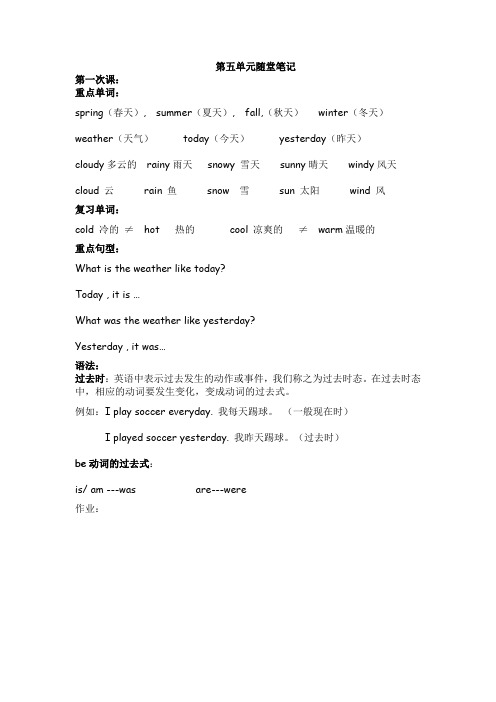
第五单元随堂笔记第一次课:重点单词:spring(春天), summer(夏天), fall,(秋天)winter(冬天)weather(天气)today(今天)yesterday(昨天)cloudy多云的rainy雨天snowy 雪天sunny晴天windy风天cloud 云rain 鱼snow 雪sun 太阳wind 风复习单词:cold 冷的≠hot 热的cool 凉爽的≠warm温暖的重点句型:What is the weather like today?Today , it is …What was the weather like yesterday?Yesterday , it was…语法:过去时:英语中表示过去发生的动作或事件,我们称之为过去时态。
在过去时态中,相应的动词要发生变化,变成动词的过去式。
例如:I play soccer everyday. 我每天踢球。
(一般现在时)I played soccer yesterday. 我昨天踢球。
(过去时)be动词的过去式:is/ am ---was are---were作业:第二次课:重点单词:umbrella雨伞, raincoat 雨衣,boots雨靴,靴子,shorts短裤T-shirt 体恤衫sandals 凉鞋sunglasses,太阳镜go swimming 游泳go to the beach 去海滩go to the park 去公园go on a picnic 去野餐fly a kite 放风筝ride a bike 骑自行车重点句型:1.What are you wearing?你穿什么?What is she/he wearing?I am wearing …我穿… She/He is wearing…2.What do you wear in the spring? 你春天穿什么?I wear a T-shirt in the spring. 我春天穿体恤衫。
小学四年级英语随堂测文字解析Lesson4——完整版笔记

单词学习感受:我得了__________颗海星,获得了________称号。
基础部分:挑战篇:哪些知识掌握地较好;哪些知识需要好好复习;我想对子涵大王老阿姨说____________。
play :玩+戏剧h o l e 洞draw: 画(重视线条)bus ticket 公交车车票反义词:buy 买子涵大王Lesson 4 Gert Does It Herself1.pl ay戏剧2.r o l e角色3.p ai nt (用颜料)绘画4.t i ck e t 票5.s e ll售卖6.pl a n 计划;设计7.t ea m 团队句子学习感受:我得了__________颗海星,获得了________称号。
哪些知识掌握地较好;哪些知识需要好好复习;我想对子涵大王老阿姨说____________。
1. 结构:Who can + 动词原形+其他部分?用法:谁能做某事?例句:Who can sell tickets?谁可以卖票呢?2. 结构:be good at + doing用法:擅长做某事例句:You are good at selling tickets. 你擅长卖东西。
子涵大王Lesson 4 Gert Does It Herself子涵大王Lesson 4 Gert Does It Herself Phonicsc a k e f a c e n a m e m a k e在“元音字母a+一个辅音字母+e”结构中,字母a发它的字母本身音,而e不发音。
学习感受:我得了__________颗海星,获得了________称号。
哪些知识掌握地较好;哪些知识需要好好复习;我想对子涵大王老阿姨说____________。
pop第四单元随堂笔记

第四单元随堂笔记第四单元第一次课:重点单词:plain草原snow and ice冰雪jungle丛林chimpanzee黑猩猩parrot鹦鹉ostrich鸵鸟polar bear 北极熊penguin企鹅复习单词:kangaroo袋鼠理解单词:pouch 育儿袋paw爪子two toes on each foot 每个脚上有两个脚趾短语:in the hot jungle 在热带雨林on the plains在草原上in the cold snow and ice 在寒冷的北极句型:重点句型:Parrots live in the hot jungle. 鹦鹉住在热带丛林。
知识点:Parrots 名词加复数代表一类事物,主语按复数处理,主语后的谓语动词不需要加超人的帮助。
复习句型:Parrots can fly. 鹦鹉会飞。
Parrots can’t swim. 鹦鹉不会飞。
A parrot has a long tail. 鹦鹉有长尾巴。
A parrot doesn’t have a long nose. 鹦鹉没有长鼻子。
作业:第四单元第二次课:复习单词:forest森林lake and river河流desert沙漠ocean海洋camel骆驼crocodile鳄鱼whale鲸鱼deer鹿复习单词:fish鱼理解单词:hump驼峰短语:in the hot desert 在热带沙漠in the lakes and rivers在河流湖泊in the ocean 在海洋中in the cool forest 在凉爽的森林句型:同上节课相同作业:第四单元第三次课:单词:复习上两节课单词句型:Do you love it? Yes,I do. No, I don’t.你爱…?Do they live…? Yes , they do. No ,they don’t.他们住在…?Do they have…?他们有…?Can they...? Yes, they can. No, they can’t.他们能做什么吗?作业:。
上海预备班六年级英语下册随堂笔记U2P3上
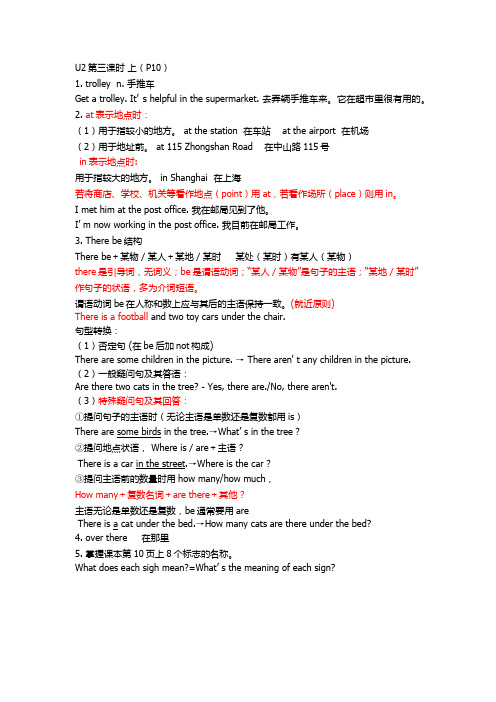
U2第三课时上(P10)1. trolley n. 手推车Get a trolley. It’s helpful in the supermarket. 去弄辆手推车来。
它在超市里很有用的。
2. at表示地点时:(1)用于指较小的地方。
at the station 在车站 at the airport 在机场(2)用于地址前。
at 115 Zhongshan Road 在中山路115号in表示地点时:用于指较大的地方。
in Shanghai 在上海若将商店、学校、机关等看作地点(point)用at,若看作场所(place)则用in。
I met him at the post office. 我在邮局见到了他。
I’ m now working in the post office. 我目前在邮局工作。
3. There be结构There be+某物/某人+某地/某时某处(某时)有某人(某物)there是引导词,无词义;be是谓语动词;“某人/某物”是句子的主语;“某地/某时”作句子的状语,多为介词短语。
谓语动词be在人称和数上应与其后的主语保持一致。
(就近原则)There is a football and two toy cars under the chair.句型转换:(1)否定句 (在be后加not构成)There are some children in the picture. → There aren' t any children in the picture. (2)一般疑问句及其答语:Are there two cats in the tree? - Yes, there are./No, there aren't.(3)特殊疑问句及其回答:①提问句子的主语时(无论主语是单数还是复数都用is)There are some birds in the tree.→What’ s in the tree?②提问地点状语, Where is/are+主语?There is a car in the street.→Where is the car?③提问主语前的数量时用how many/how much,How many+复数名词+are there+其他?主语无论是单数还是复数,be通常要用areThere is a cat under the bed.→How many cats are there under the bed?4. over there 在那里5. 掌握课本第10页上8个标志的名称。
POP第三单元随堂笔记

第三单元第一次课:重点单词:city 城市country 农村building 建筑物department store 百货商店museum 博物馆skating rink 滑冰场delicious 美味的(形容词)different 不同的(形容词)kind 种类people 人复习单词:movie theater 电影院park 公园restaurant 饭店理解单词:love 爱短语:1. restaurant with delicious food 有美味食物的饭店介词with 的用法:1. I go to school with my sister. 我和妹妹一起去学校。
with 表示“和”某人一起做某事。
2. restaurant with delicious food 有美味食物的饭店with 表示“有,带有”e.g.a girl with yellow hair. 有黄色头发的女孩。
2.different kinds of +名词(如果该名词可数就加复数)e.g. different kinds of flowersdifferent kinds of carsdifferent kinds of peopledifferent kinds of animals作业:※※背诵书22页第一部分,并且必须会背写。
第三单元第二次课:重点单词:grass 草fence 栅栏barn 牲口棚field 田野pond池塘lake 湖fish 钓鱼复习单词:bird 鸟tree树flower 花house 马animal 动物短语:in the country 在乡村in the fields 在田野里in the ponds and lakes 在池塘里和湖里介词in 的用法:1.表时间,表示在一段时间内,in the morning 在早晨in the afternoon 在下午in January 在一月in March 在三月in spring 在春天in summer 在夏天in a year 在一年2.表示位置,表示“在……里面”,也可以表示在一个很大的空间内。
大桥外语新概念I-随堂笔记107-108
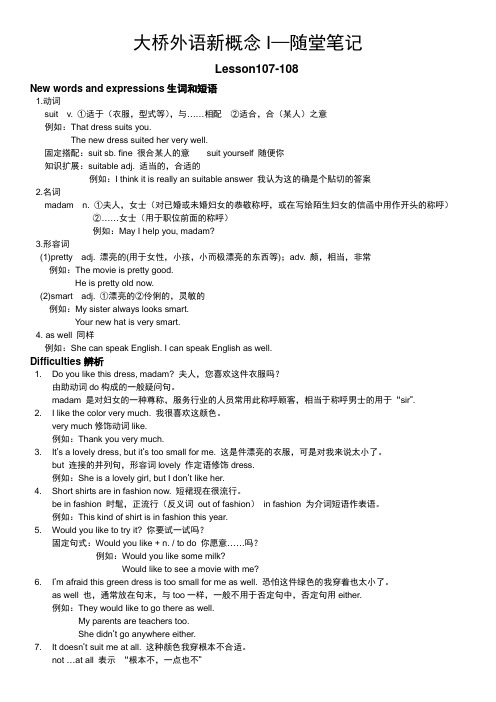
大桥外语新概念I—随堂笔记Lesson107-108New words and expressions生词和短语1.动词suit v. ①适于(衣服,型式等),与……相配②适合,合(某人)之意例如:That dress suits you.The new dress suited her very well.固定搭配:suit sb. fine 很合某人的意suit yourself 随便你知识扩展:suitable adj. 适当的,合适的例如:I think it is really an suitable answer 我认为这的确是个贴切的答案2.名词madam n. ①夫人,女士(对已婚或未婚妇女的恭敬称呼,或在写给陌生妇女的信函中用作开头的称呼)②……女士(用于职位前面的称呼)例如:May I help you, madam?3.形容词(1)pretty adj. 漂亮的(用于女性,小孩,小而极漂亮的东西等);adv. 颇,相当,非常例如:The movie is pretty good.He is pretty old now.(2)smart adj. ①漂亮的②伶俐的,灵敏的例如:My sister always looks smart.Your new hat is very smart.4. as well 同样例如:She can speak English. I can speak English as well.Difficulties辨析1. Do you like this dress, madam? 夫人,您喜欢这件衣服吗?由助动词do构成的一般疑问句。
madam 是对妇女的一种尊称,服务行业的人员常用此称呼顾客,相当于称呼男士的用于“sir”.2. I like the color very much. 我很喜欢这颜色。
very much修饰动词like.例如:Thank you very much.3. It’s a lovely dress, but it’s too small for me. 这是件漂亮的衣服,可是对我来说太小了。
英语之随堂笔记(人教版七年级上)

初一上册之课堂笔记Unit 1~81. on、above都表示在某物体的位置上,但是,on是在物体的接触面上,而above 则是与物体有一段距离。
2. Please take things to your sister.(祈使句:动词用原形)3. football: ①soccer ball 英式足球②rugby ball 美式足球(橄榄球)4. let’s = let us dislike= don’t like5. It is some salad. ( salad是不可数名词,因此谓语动词用it。
)6.可数名词与不可数名词:⑴可数名词的定义:普通名词所表示的人或事物,是可以按单个来计算的。
⑵不可数名词的定义:如果普通名词所表示的事物,一般来说,是不能按单个来计算的。
7.省略主语的祈使句:⑴Close your book, please!(肯定句)⑵D on’t open your book. (否定句)8. I like apples, she likes apples, too.= I like apples, she also likes apples.9. dinner和supper都有晚饭的意思,但两者还是存在区别的,dinner 是指大型饭局,而supper是指家常便饭。
10. some+可数名词复数形式/ 不可数名词11. there be:某处存在某物have:某人拥有某物12. sounds interesting: 系动词+形容词=表系表结构13. lots of = a lot of :用在肯定句,修饰可数名词复数形式或不可数名词many、much :用在疑问句,many修饰可数名词复数形式,much修饰不可数名词。
14.反义词:like→dislike fair→unfair15. at all :根本for :对于,就……而言be on sale :特价in white T-shirt :in,穿clothes :衣服(复数)sell :行为动词16. Let sb. do sth.17.⑴like to do :一次性动作⑵like doing :经常性动作18. How much is this bag ?=What’s the price of this bag ?19.多个形容词在名词前时,先说大小形状再说颜色,描述性的形容词放在最前。
英语随堂笔记

Life is meant to be a path upward not downward. Only when it is truly dark will we see the stars._----- Martin Luther King Jr. Dedicate devote commitDictate indicate专注于。
Sb is dedicated /devoted/committed to...\Make commitmentA committed studentWe cannot be discouraged by what it is. We’ve got to keep pushing what we are up to.In disregard ofIn spite ofIrrespective of color, race, religion and nationality, we are guaranteed equal rights.E learningIrrespective ofReckless of…In disregard ofAn overwhelming proportion of…A fraction of…BulkFall apartTilt topple overOverthrow overturnRumor has it that…Myth has it that…, whereas I would argue that…Prestigious universitiesIt is alleged that….People used to believe that…IconFashion iconIconic buildingI don’t care a thing about it.I don’t give a damn about it.Undermine: impairUnderlie underline underscore Underline/underscore/pinpoint/highligh t/Stress + importance….在(。
第六单元随堂笔记

第六单元随堂笔记第一次课:重点单词:hear 听taste尝到smell闻feel感受finger手指tongue 舌头touch摸delicious 美味的sweet 甜的hard硬的soft软的复习单词:good bad see look happy sad句型:We see with our eyes.我们有眼睛看。
It is sweet。
它是甜的。
It tastes sweet。
它尝起来是甜的。
作业:第二次课:重点单词:carnival(嘉年华) band(乐队)lemon(柠檬)lemonade(柠檬水)pop corn(爆米花)sound(听起来)nice(好的)salty(咸的)sour(酸的)loud(大声的)复习单词:seal(海豚)lamb(羊)clown(小丑)salt(盐)知识点:taste ,look, smell, sound, feel被称之为感官动词,都是与感觉器官有关的动词,用法上与系动词Be 相似。
感官动词+形容词。
翻译成尝起来,看起来,闻起来,听起来,感觉上。
例如:The apple tastes sweet。
这个苹果尝起来甜。
The apple is sweet. 这个苹果甜。
句子中需要注意,1,选择合适的感官动词。
2,当主语是第三人称单数时,动词加s/es.例如:1,The clown taste sad. (错误) 这个小丑尝起来伤心。
The clown looks sad. (正确)这个小丑看上去伤心。
2. The apple tastes good.(正确)The apple taste good.(错误)句型:It tastes delicious/good/sweet/salty.It looks happy/sad/good.It sounds loud/good/bad.It smells good/bad/delicious.It feels hard/soft.They taste delicious/good/sweet/salty. They look happy/sad/good.They sound loud/good/bad.They smell good/bad/delicious.They feel hard/soft.作业:用适当的词填空1. The band great.2. The ice cream sweet.3. The pop corn good.4. The hot dogs delicious.5. The seals happy.6. The lamb soft.7. The lemonade sour.8. It loud.9. The clown sad.10. Salt salty.11. The girls ________happy.12.My mother _______sad.13.The chair ________ hard.14. The music(音乐) ________ bad.15. The bed _______soft.第四次课:过去时的简单运用重点单词:Is/am—was are—were go—went重点句型:we went to the park.Yesterday was sunny.we are going to the park语法::1.过去时:英语中表示过去发生的动作或事件,我们称之为过去时态。
人教版五年级英语上册随堂整理笔记

第一模块My new teachers一、常用句型Who’s your +学科名称+ teacher ?(谁是你/你们的.....老师?)Mr / Miss ……例句:Who’s your English teacher ?Mr Carter.What’s he / she like ? (他/她长什么样?)He / She is tall and strong .(他/她又高又壮)主语+be动词+from+地点名词(介绍某人来自哪里)例句:He’s from Canada .Be动词+某人+形容词?(询问某人体貌特征或性格特点)肯定回答:Yes,主语+be动词。
否定回答:No,主语+be动词+not。
例句:Is she quiet ?No, she isn’t. She’s very active .Is your principal young ?No, she isn’t. She’s old and kind .二、常用短语Who’s = Who is What’s = What is He’s = He is She’s = She is It’s = It isthin and tall young and funny active and kind strict and smart tall and stronga new math teacherbe from…..look atat school/homeHer class is so much fun .That’s for sureplay football a football player a university studentYou’re right.Oh , I see .Let me try . Let’s play football .You’re great !Can I join you ?Ten to three . We won !三、单词四会单词:math English Chinese P.E. art music science computer young funny fun tall strong kind old short thin Mr Miss like my school new strict smart active quiet very butfrom Canada know science principal lady class really pretty cool guess sure great player shoot join score四、认识单词have 表示“有;吃或喝”,还可以用来描述病情,比如:We have a new math teacher .(表示“有”)I have rice and vegetables for lunch .(表示“吃”)He has a cold .(表示“病情”)想一想:什么时候用“have”,什么时候用“has”?this和that:this是“这;这个”;that是“那;那个”五、物主代词六、人称代词第二模块My days of the week一、常用句型What day is it today ?It’s Wednesday .What do you have on Thursdays ?We have English , math and science on Thursdays .想一想,什么时候用“do”,什么时候用“does”想一想,这个句子和下面的区别:What do you have for lunch on Thursdays ?I have tomatoes , tofu and fish .I like Mondays ,because I like P.E. .John likes Mondays ,because he likes P.E. .What do you do on Saturdays ?I often read books and watch Tv .想一想,什么时候用“do”,什么时候用“does”What does he/she/xiaoming do on Saturdays ?He/She often reads books and watches Tv .What about you ?I do my homework , too .二、常用短语me tooWhat about you ?do homework / houseworkdo sportswatch Tvread booksplay computer gamesplay ping-pongget upplay with youThat’s great !What’s the matter ?do some shoppingon weekendsat 7 a.m. (at 9 p.m.)in the morning/afternoon/eveningin January、February、March、April、May、June、July、August、September 、October、November、December next MondayWait ! Tomorrow is Thursday.It’s 8:00. It’s time to get up .It’s time to do your homework .a new pair of sneakersa box of crayonsMother’s Day is the second Sunday in May.Father’s Day is the third Sunday in June.I need to buy some new books.三、单词四会单词:Monday = Mon.Tuesday = Tue.Wednesday = Wed.Thursday = Thu.Friday = Fri.Saturday = Sat.Sunday = Sun.day have on tooSocial StudiesMoral Educationyeah want win class because wait tomorrow often paint game sweet love time aunt need enough第三模块What’s your favourite food ?A部分一、常用句型What would you like…for ……?I’d like……Would you like…Yes , please .No ,thanks .What do you have for……?I have……第三人称时:What does he/she/it have for……?He/She/It has……二、常用短语would likeHere is (= Here’s)our school menu . That sounds good .for breakfast/lunch/dinneron Monday/Tuesday/Wednesday/Thursday/Friday/ Saturday/SundayIt’s time for lunch .三、单词四会单词:tofu eggplant potato tomato (green beans)fish for lunch weI’d like = I would likepork mutton cabbage hungry onion menusound here dinner noodle beef chickensandwich hamburger ice-cream dumpling meathot dogapple pear peach banana watermelon orange milk四、可数名词和不可数名词(一)不可数名词:是指不能用数来计算的名词,一般没有复数形式,比如:work 工作,meat 肉,soup 汤等等。
(完整word)六年级英语下册随堂笔记.docx
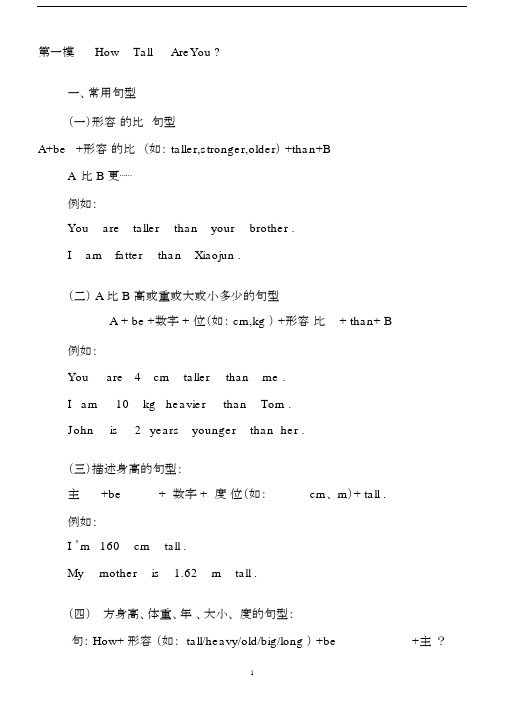
第一模How Tall Are Y ou ?一、常用句型(一)形容的比句型A+be+形容的比(如: taller,stronger,older) +than+BA比 B 更⋯⋯例如:You are taller than your brother .I am fatter than Xiaojun .(二) A 比 B 高或重或大或小多少的句型A + be+数字 +位(如: cm,kg ) +形容比 + than+ B例如:You are4cm taller than me .I am10kg heavier than Tom .John is2years younger than her .(三)描述身高的句型:主+be+ 数字 + 度位(如:cm、 m)+ tall .例如:I ’m 160 cm tall .My mother is 1.62 m tall .(四)方身高、体重、年、大小、度的句型:句: How+ 形容(如: tall/heavy/old/big/long ) +be+主?答句:主语+be 动词+ 数字 + 单位(如: cm/kg/years)+ 形容词.例如:How tall are you ?I ’m 160 cm tall .(五)形容词比较级的变化规则构成方法规一般在词尾加er则变化以字母 e 结尾的词,加r。
末尾只有一个辅音字母的重读闭音节词,应先双写这个辅音字母,再加 er。
以y 结尾,并且 y 前面是辅音字母的词,先把 y 变为 i,再加 er。
不规则变原级比较级tall taller high higher short shorter strong stronger young younger fine finer late laterfat fatter big bigger thin thinner easy easier funny funnier heavy heavier good better bad/ill worse many/much more little less化(六)如何用“how” 体貌How tall are you ?How old are you ?How heavy is your brother ?How long is its tail ?How big are your hands ?(七)“one”做代的用法one 是数字“一”的意思,但有用它做代,用来代替上文中已出的,以避免重复。
新概念1第127课随堂笔记

Lesson 127 A famous actress单词比一比1、It must be Karen Marsh, the actress.1、must 的主要用法。
1)表示必须、必要We must do everything step by step .我们必须按部就班地做一切事情。
2)must be + 表语的结构,通常表示猜测,含有“一定”之意。
(只用在肯定句中)否定形式为can't。
He must be an honest boy. 他一定是个诚实的男孩。
He can’t be an honest boy.他不会是个诚实的男孩。
This must be your room. 这一定是你的房间。
This can’t be your room. 这不可能是你的房间。
3)must 的否定式有两个:当回答由must引起的问题时,否定答复要用needn’t表示“不必”、“无须”、“用不着”、“不一定”的意义。
Must I go tomorrow?明天我必须去吗?Yes, please.是的,请吧!No , you needn’t. 不,你不必去。
当表示“不应该”、“不许可”、“禁止”时,就用must not。
Exercise (中考回顾))1.—Can I tell Peter about the news?—No,I don't want anyone else to know it.You____keep it to yourself.A.mustB.needC.canD.may()2.—Must I do the work today?—No,you ____.Y ou may do it tomorrow.A.can'tB.mustn'tC.shouldn'tD.needn't()3.—Listen!Is it Linda singing in the next room? —No,it ____ be her. She is still in Shanghai.A.can'tB.couldn'tC.may notD.might not ( ) 4.If the traffic light is red,you____cross the road.It's very dangerous.A.don'tB.mustn'tC.needn'tD.wouldn't2、I though so.替代It must be Karen Marsh, the actress.So如此、这样,其含义等同于suchso 与such的区别1.such +形容词+名词so + 形容词/ 副词______ a good girl/ _______ good a girlIt is _____hard work that he can’t do it.The work is _____hard that he can’t do it.It is ______bad weather that we can’t go out.The weather is ______bad that we can’t go out.I have never read _______ an interesting story.I have never read _______ interesting a story.1.. __________beautiful birds___________ wonderful matches___________ interesting books2. _______many people_______few mistakes________ much water_________ little milk3、Let me have another look.•( )The food is not enough. We need ____bags of food.• A. other four B. more four• C. four other D. four more数词+more =another +数词表示再来------,还要------ 4、I read she's twenty-nine, but she must be at least forty.•at least 至少•at most 最多5、She was a famous actress when I was still at school.•【高手过招】•选择合适的介词填空:• 1. Mark Twin was famous _______a children-story writer.• 2.He is famous_______his skill in playing footb all.• 3. Confucius Temple is famous ______ all over the world.• 4. He is famous _____ a singer _____ his beautiful songs .be famous for【知识归纳】※be famous for表示人“以某种知识技能,作品或特征而出名”,表示某地“以某种特产或特征出名”,或表示某事“以其内容、特征、价值等而被人所知”。
pop英语第一单元随堂笔记
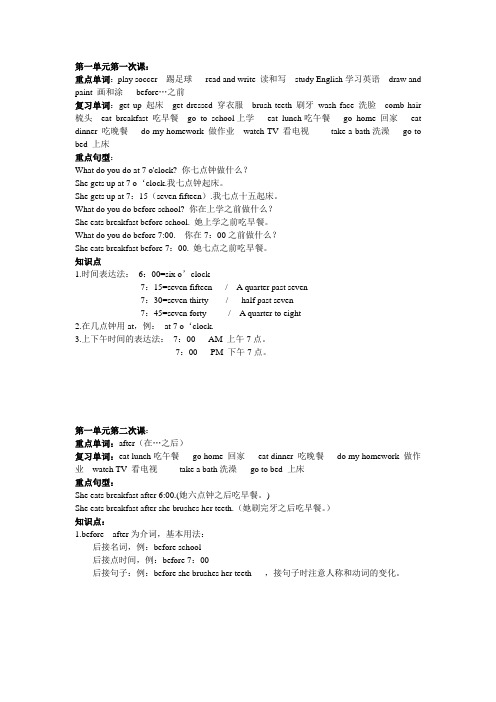
第一单元第一次课:重点单词:play soccer 踢足球read and write 读和写study English学习英语draw and paint 画和涂before…之前复习单词:get up 起床get dressed 穿衣服brush teeth 刷牙wash face 洗脸comb hair 梳头eat breakfast 吃早餐go to school上学eat lunch吃午餐go home 回家eat dinner 吃晚餐do my homework 做作业watch TV 看电视take a bath洗澡go to bed 上床重点句型:What do you do at 7 o'clock? 你七点钟做什么?She gets up at 7 o‘clock.我七点钟起床。
She gets up at 7:15(seven fifteen).我七点十五起床。
What do you do before school? 你在上学之前做什么?She eats breakfast before school. 她上学之前吃早餐。
What do you do before 7:00. 你在7:00之前做什么?She eats breakfast before 7:00. 她七点之前吃早餐。
知识点1.时间表达法:6:00=six o’clock7:15=seven fifteen / A quarter past seven7:30=seven thirty / half past seven7:45=seven forty / A quarter to eight2.在几点钟用at,例:at 7 o‘clock.3.上下午时间的表达法:7:00 AM 上午7点。
7:00 PM 下午7点。
第一单元第二次课:重点单词:after(在…之后)复习单词:eat lunch吃午餐go home 回家eat dinner 吃晚餐do my homework 做作业watch TV 看电视take a bath洗澡go to bed 上床重点句型:She eats breakfast after 6:00.(她六点钟之后吃早餐。
人教版本小学五年级的英语下册的随堂整理笔记记录.docx
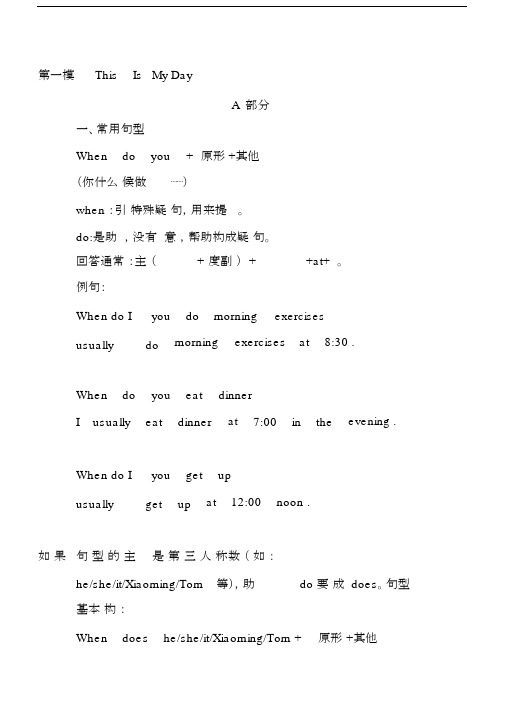
第一模This Is My DayA部分一、常用句型When do you +原形 +其他(你什么候做⋯⋯)when :引特殊疑句,用来提。
do:是助,没有意,帮助构成疑句。
回答通常:主(+度副) ++at+。
例句:When do I usuallyyoudodo morning exercisesmorning exercises at 8:30 .When do you eat dinnerI usually eat dinner at7:00in the evening .When do I usuallyyougetgetup atup12:00noon .如果句型的主是第三人称数(如:he/she/it/Xiaoming/Tom 等),助do 要成 does。
句型基本构:When does he/she/it/Xiaoming/Tom +原形+其他例句:When does He usuallyhegetsgetupupat7:00 .二、常用短语do morning exerciseseat breakfasteat dinnerget uphave English classplay sportson the weekendin the morning/eveningWhat about youCan I ask you some questionsLook here ! This is my weekend timetable . It’ s great .go swimminggo shoppinggo to schoolgo to workgo to bedgo homeexcuse meI am sorry.Sometimes I climb mountains .play the pianovisit grandparentswatch videosWhat do you doTell us about your day !Thank you for telling me about your day .You’ re welcome .三、单词when usually often at about too day ask work evening noon tell policeman some sure四、一般现在时一般现在时表示现在经常发生的动作、行为或存在的状态等。
五年级英语上册随堂笔记 Unit 6

Unit 6
1.In a nature park 在一个自然公园里
2.summer holiday 暑假
3.winter holiday 寒假
4.many small houses 许多小房子
5.tall buildings 高楼大厦
6.in my village 在我的村庄
7.in my city在我的城市里
8.my holiday picture我假期的照片
9.this park这个公园
10.this weekend这个周末
11.near here在这附近
12.very far很远
13.over there那边
14.the wind blows风吹着
15.the river flows河水流着
16.a beautiful day美丽的一天
17.the other另一个
18.over the mirror在镜子上方
19.in the lake在湖里(在湖里,用于游泳,潜水等等)
20.on the lake 在湖面上,用于泛舟,垂钓等等
21.in the sky在天空中
22.some pandas一些熊猫
23.the white clouds白云
24.the fresh air=the clean air清新的空气
25.find out=look for寻找,找到
26.the blue sky蓝天
27.run on the grass在草地上跑
28.many fish很多鱼
29.near village在村庄附近
30.in the middle在中间。
五年级下册英语随堂笔记

五年级下册英语随堂笔记English:In the fifth grade English textbook, students will continue to develop their English skills in reading, writing, listening, and speaking. They will learn more advanced vocabulary and grammar structures to help them communicate effectively in various situations. The topics covered in the textbook may include daily routines, hobbies, food, travel, and more. Students will also practice reading comprehension, writing paragraphs, participating in conversations, and giving presentations. By the end of the fifth grade, students should be able to have basic conversations, write short essays, and understand English texts at a more advanced level.中文翻译:在五年级的英语教科书中,学生将继续发展他们在阅读、写作、听力和口语方面的英语技能。
他们将学习更高级的词汇和语法结构,以帮助他们在各种情况下有效沟通。
教科书涵盖的主题可能包括日常生活、爱好、食物、旅行等。
学生还将练习阅读理解、写段落、参与会话和进行演讲。
到了五年级结束时,学生应该能够进行基本的对话,写短文和理解更高级别的英语文本。
六年级上册英语pe p版随堂笔记

六年级上册英语pe p版随堂笔记
一、词汇笔记
1. 复习:动物类词汇:dog,cat,bird,lion,tiger等;颜色类词汇:red,blue,green,yellow等;水果类词汇:apple,banana,pear,orange等。
2. 新学:学科类词汇:English,math,Chinese,PE等;身体部位类词汇:head,face,nose,mouth,eye等。
二、语法笔记
1. 复习:一般现在时态用法,包括肯定句、否定句、一般疑问句及其肯定和否定回答等。
2. 新学:名词所有格用法,如:Tom's dog,the bluebird's nest等。
三、作业与练习笔记
1. 完成课本相关作业与练习,巩固新旧知识点。
2. 准备期中考试,复习所学知识点,调整学习状态。
四、课堂笔记补充
1. 老师补充:可能涉及其他主题的词汇和表达,如天气、季节、节日等。
2. 自我总结:回顾所学知识点,思考自己存在的问题,制定下一步学习计划。
总的来说,六年级上册英语PEP版的学习需要注重词汇积累、语法掌握和作业练习。
通过不断地复习和巩固,我们可以更好地掌握所学知识,为今后的英语学习打下坚实的基础。
第 1 页共 1 页。
四年级下册英语Module 6随堂笔记A4打印版 共2页

四年级英语下册Module 6随堂笔记unit1活动一、1、Were you ….? Yes, I was / No, I was’t. 过去式的一般疑问句 2、短语at school 在学校 at the park 在公园 at the zoo 在动物园 3、表示时间的时间状语:yes t e r day then(当时,那时)last+时间 如:last week(上周)last night(昨晚),last year(去年)活动二、1、This is … 介绍用语,This is my little brother.2、How are you? Very well,thank you. And how are you ?Fine,thanks.3、Is it…? 一般疑问句 肯定回答Yes,it is.否定回答No,it isn’t.4、Was it…? 过去式的一般疑问句 肯定回答Yes,it was.否定回答No,it wasn’t.5、want to 想要做…事情 want to+动词原形6、Are you …? Yes ,I am. / No,I am not.Grandpa f o r our Chinese lesson.Module6 unit21、He’s strong 句式结构: 主语+be动词+形容词 (module1学过) 用来描述某人特征,区别于 主语+be+a/an+形容词+名词2、Was he…? Yes,he was. / No,he wasn’t.3、Where is he? 特殊疑问句,where 特殊疑问词 提问地点,他在哪里? 同类:what 做/干什么,who 人,whose 谁的,when/what time 时间,4、This is my grandpa. my我的,our 我们的 your 你的,你们的5、Shenzhen is a big city now./Was it a big city then?is 对应 now was 对应 then表示过去的时间: yes t e r day then(当时,那时)last+时间 如:last week(上周),last night(昨晚),last year(去年) last mouth(上月),last time(上次)6、反义词fat --thin slow --–fast small---big old ---new7、I can win. can+动词原形 win(动词)获得胜利winner (名词)冠军。
- 1、下载文档前请自行甄别文档内容的完整性,平台不提供额外的编辑、内容补充、找答案等附加服务。
- 2、"仅部分预览"的文档,不可在线预览部分如存在完整性等问题,可反馈申请退款(可完整预览的文档不适用该条件!)。
- 3、如文档侵犯您的权益,请联系客服反馈,我们会尽快为您处理(人工客服工作时间:9:00-18:30)。
第3章主要学习了语言测试,包括雅思,托福,剑桥商务英语资格考试与全国大学英语等级考试。
第4章主要学习了应用语言学基础知识,包括了语境,体裁,话语,言语行为以及特殊目的英语。
你对“语言学习元知识体系”中的哪个章节感兴趣,请详细举例说明你为什么对这一章节的知识感兴趣?(200字)
2015-2016学年秋季学期“自主学习能力培养指导课”学习心得1
姓名
王鞠浩
学号
20155519
考试序号
13
班级
软件二班
分数
16
语言学习元知识体系
这一部分我们学习了几章,请言简意赅描述一下每一章包括的主要内容?(100字)
答;四章,第一章主要介学习了外语学习理论基础,包括人文主义,认知学习理论,构建理论,多元智能,二语习得理论以及语言评价等知识。
结合你自身的英语学习,请详细举例说明你是如何把你感兴趣的理论知识运用到你的英语学习中的?(300字)
答:外语学习有很多理论知识,例如认知学习理论,多元智能理论,二语习得理论等。我把我感兴趣的认知学习理论运用到我的学习中。我根据自己的需要和兴趣,利用过去所掌握的知识,经验,对外界学习刺激做出主动地,有选择的信息加工。比如英语中的一些困难,可以联系实际用简单的方法和理论快速的记忆解决,对于我来说利用过去的知识经验学习新知识,这样就使学习本身就具有了层次感,学起来会简单很多,我认为只有发挥学习主体的主观能动性,使其积极主动投入学习,充分调动自己的内在动——好奇的驱动力,胜任的驱动力,互惠的驱动力,才能实现学习目标才能更大的激发自己的潜力,是自己爱学习会学习,我相信我已经通过学习此节获得了好的学习方法,我的英语能力也会更上一层楼。
答:我对第四章应用语言学ห้องสมุดไป่ตู้础知识感兴趣。
因为我们可以掌握一定的应用语言学基础的知识,提高语言意识,强化语言对文化和社会关系的建构作用。
我尤其热爱语境部分,我可以通过对话的形式锻炼我的口语能力,比如维索尔伦的语境研究这节,通过对话的形式为学生们讲述本书课的内容,生动形象更加吸引同学们的兴趣,通过对话相互提供新信息的方式将谈论对象从最初的一个符号逐步地丰富为鲜活的形象。
